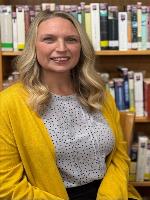To Accessibility and Beyond:Increasing Student's Literacy and Fluency through Adaptive Tools
,
Colorado Convention Center, 205
Presenters
Session description
Purpose & objective
The educational challenge faced in my presentation is students struggling with reading, spelling and comprehension. I was approached by a classroom teacher for assistance in which high school freshman students continually asked for reading passages to be re-read to them and struggling with spelling below level words.
The purpose of my presentation is to share my experience teaching our Freshman students five accessibilities tools (Screenshot Reader, Select to Speak, Dictation, Rewordify and Best Reader View) that will increase their literacy and fluency. I also will speak to the collaboration as a Library Media Specialist working with our Special Education Instructional Coach, School Based Instructional Coach, Assistive Technology Coordinator and our Digital Learning Coach.
My objectives for this presentation:
1) to bring awareness to students and teachers of the universal accessibility tools;
2) Increase the likelihood of use of the tools by sharing their individualized functions with students and engaging in practical application
If this presentation can provide one educator a solution for students or ignite a flame for one educator, it could have an impact on 100s of students. With a rate of return as large as that it is worth the time and effort to spread awareness through this platform. I will outline in this presentation that these technology tools are very much like the mechanical tools that many of us have. Tools can help us to become more efficient, fix things, and build things. They’re use is dependent on the situation and our knowledge of the tools function as well as our experience applying them to a situation. For example, a hammer will not help me to do everything but when I need to nail a board down or hang a picture on the wall, I know that a hammer will help me accomplish that task. It’s up to my experience of application and my knowledge of function to utilize the tool efficiently. This is precisely the reason why it is so important to introduce these technological tools to our students in this fastly-growing, technology diverse world.
Technology to be showcased: Chromebook Accessibility Tools (Select To Speak and Dictation), Chrome Web Store Extensions (Screenshot Reader, Best Reader View) and a website (www.rewordify.com)
Presentation of this Session:
Presentation from Case Study: https://docs.google.com/presentation/d/15t4s_s2VUVEtx6HmgAn-m6QFkZrsQaTR6RtszTcJOs8/edit?usp=sharing
BCPS Universal Tools Infographic https://drive.google.com/file/d/1JjCFhrwCoPhFpNIANAByv8a9aO4XKifG/view?usp=sharing
(This has been updated since our workshop)-Important to note that best reader view was not included at the time. It may be added in the future)
Outline
Content and activities : I will be presenting information about technology accessibility tools and how they can be useful to students of all abilities and age levels with the goal of increasing literacy, fluency and efficiency. Information will be delivered to the audience in an Edtalk format when discussing a case study. I will provide a mini-lesson of the universal tools that are used in my school district while also sharing my experiences through a case study. Students in my school district are 1 to 1 with Chromebooks. Two of the Universal Tools that were used in the case study are specific to the Chromebooks that are used in my school district. The remaining tools are Google Chrome Extensions that are available to all Chrome Web browser users. Audience members can then participate in the discussion by downloading the tools via the Chrome Webstore and trying the tools for themselves.
Time: The presentation will be divided into four main sections.
*Introduction and objectives (3 minutes)
1. Discussion of the case study:
the team members,
our work with 9th grade students in a suburban school district in Kentucky.(10 minutes)
2. Showing audience members about the tools to be discussed (Screenshot Reader, Select to Speak, Dictation, Rewordify and Best Reader View) and the audience using the tools themselves (15 minutes)
3. Review of our data including students' pre and post assessment along with teacher reflection. (12 minutes)
4. Review of data analysis and how our team used our data to move forward with the accessibility tools and teaching to other students and teachers throughout our school. (9 minutes)
*Closing (1 minute)
Supporting research
Research that supports Accessibility Tools in Education:
Jackson, A. K. (2023). Closing the Digital Divide: Understanding Organizational Approaches to Digital Accessibility in Higher Education (Order No. 30485338). Available from ProQuest Dissertations & Theses Global. (2814304736). http://echo.louisville.edu/login?url=https://www.proquest.com/dissertations-theses/closing-digital-divide-understanding/docview/2814304736/se-2
Russell, A. (2011). A cognitive load approach to learner-centered design of digital instructional media and supporting accessibility tools (Order No. 1500419). Available from ProQuest Dissertations & Theses Global. (899692322). http://echo.louisville.edu/login?url=https://www.proquest.com/dissertations-theses/cognitive-load-approach-learner-centered-design/docview/899692322/se-2
Muñiz Bermudez, H. G. (2023). Cause for Complaint: A Case Study Exploring Office for Civil Rights Complaints and Resolutions Related to Digital Accessibility at Public Colleges and Universities (Order No. 30574318). Available from ProQuest Dissertations & Theses Global. (2856684812). http://echo.louisville.edu/login?url=https://www.proquest.com/dissertations-theses/cause-complaint-case-study-exploring-office-civil/docview/2856684812/se-2
Thaggard, Z. D. (2023). The Teachers' Perspective: How Can Rural Elementary Teachers Use Digital Literacy Tools to Enhance Reading?(Order No. 30575465). Available from ProQuest Dissertations & Theses Global. (2856704088). http://echo.louisville.edu/login?url=https://www.proquest.com/dissertations-theses/teachers-perspective-how-can-rural-elementary-use/docview/2856704088/se-2
Muthukumaran, A. (2023). Experiences of Middle School Students With Visual Impairments Accessing Technologies in Inclusive Classrooms (Order No. 30573660). Available from ProQuest Dissertations & Theses Global. (2854805314). http://echo.louisville.edu/login?url=https://www.proquest.com/dissertations-theses/experiences-middle-school-students-with-visual/docview/2854805314/se-2
Session specifications
ScreenShot Read and Best Reader View
Attendees will need to turn on the following accessibility tools on their chromebook
Select to Speak and Dictation.
Attendees will use the website www.rewordify.com
Change Agent
- Facilitate equitable use of digital learning tools and content that meet the needs of each learner.
Visionary Planner
- Evaluate progress on the strategic plan, make course corrections, measure impact and scale effective approaches for using technology to transform learning.
Learner
- Set professional learning goals to explore and apply pedagogical approaches made possible by technology and reflect on their effectiveness.
 Return
Return Listen and learn: Edtalk
Listen and learn: Edtalk  Trips and Tours
Trips and Tours Recorded Session
Recorded Session